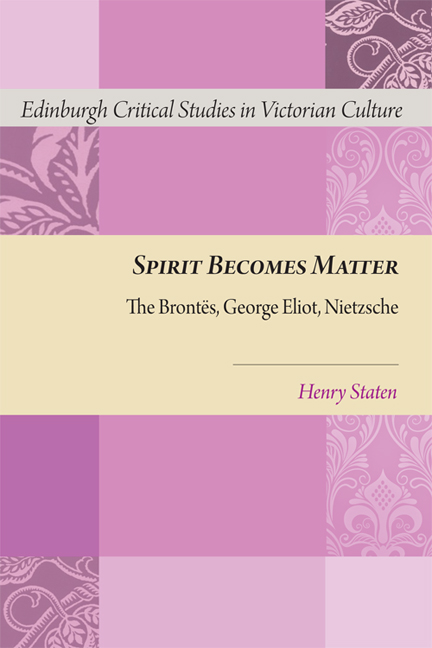Book contents
- Frontmatter
- Contents
- Series Editor's Preface
- Author's Preface
- Acknowledgements
- Dedication
- Introduction
- 1 The Poisoned Gift of Forgiveness (Jane Eyre)
- 2 Subincision of the Ethical Subject (Middlemarch)
- 3 What Things Cost in Middlemarch
- 4 The Return to the Heath (Wuthering Heights)
- 5 Spirit Becomes Matter
- Index
4 - The Return to the Heath (Wuthering Heights)
Published online by Cambridge University Press: 05 August 2016
- Frontmatter
- Contents
- Series Editor's Preface
- Author's Preface
- Acknowledgements
- Dedication
- Introduction
- 1 The Poisoned Gift of Forgiveness (Jane Eyre)
- 2 Subincision of the Ethical Subject (Middlemarch)
- 3 What Things Cost in Middlemarch
- 4 The Return to the Heath (Wuthering Heights)
- 5 Spirit Becomes Matter
- Index
Summary
To turn to Wuthering Heights is to enter a world radically different from the one inhabited by the characters of Charlotte Brontë and George Eliot. Emily Brontë is in this novel minimally interested in the dialectic of moral ideology and physio-psychological energy; her focus is, rather, on the direct expression of this energy in the struggle for domination among her various actors. Her gaze, like that of Baudelaire, is relentlessly eschatological, set always on the ultimate fate of mortal, sexed being; yet, strikingly, given its continual evocations of heaven and hell, the protagonist of Wuthering Heights evinces none of the characteristic nineteenth-century struggle with the remnants of belief. There is in Heathcliff no despair at the finality of the death of the body; no nostalgia for the heaven that once was; no turn to Christian morality as a replacement for Christian belief; no stance of bitter, or resigned, or heroic defiance of religious metaphysics. Baudelaire was still tormented by a latently Christian dualism, and even Nietzsche had to labour to get beyond Christian-Platonic metaphysics so that he could see the world and human life in an entirely worldly perspective; it is a breathtaking achievement on the part of Emily Brontë to have conceived, in 1847, a protagonist who is as simply apart from Christian belief and Christian morality as a character from Greek antiquity.1 Like an authentic pagan, Heathcliff merely despairs in the wake of Catherine's death, with no thought of any kind regarding transcendence.
Wuthering Heights is, in consequence, the great poem of mourning of modernity, as the Iliad was of antiquity. The two works, in fact, have much in common. They both tell the working out by means of vengeance of the unassuageable, grief-driven anger of their protagonists. The supposed dramatic apex of Wuthering Heights, the agony of Catherine and her final parting from Heathcliff, is really just the climax of the ‘rising action’; the working out of Heathcliff's mourning, all the way to his ecstatic death, is its untying.
- Type
- Chapter
- Information
- Spirit Becomes MatterThe Brontes, George Eliot, Nietzsche, pp. 132 - 176Publisher: Edinburgh University PressPrint publication year: 2014



